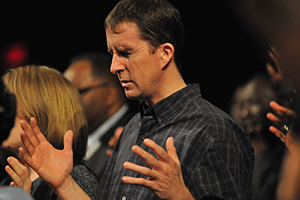CHURCH HEALTH
 Under the strategic priority of Church Revitalization, church health strategies in the EPC are based on a three-fold plan in the areas of evangelism, church health, and transitional pastoring. The information presented below in the “Transforming Our Churches” section is an overview of our approach. This material is tested, EPC-centric, practical, and designed to be implementable in all churches, large or small.
Under the strategic priority of Church Revitalization, church health strategies in the EPC are based on a three-fold plan in the areas of evangelism, church health, and transitional pastoring. The information presented below in the “Transforming Our Churches” section is an overview of our approach. This material is tested, EPC-centric, practical, and designed to be implementable in all churches, large or small.
Use these quicklinks to navigate to a specific section of this page:
Transforming Our Churches
Structure and Responsibilities
Contacts
TRANSFORMING OUR CHURCHES
 The EPC exists to carry out the Great Commission of Jesus as a denomination of Presbyterian, Reformed, Evangelical, and Missional congregations. Our desire is that every one of those 630+ congregations will be an outpost of the Kingdom, with every member viewing himself or herself as a missionary on a mission.
The EPC exists to carry out the Great Commission of Jesus as a denomination of Presbyterian, Reformed, Evangelical, and Missional congregations. Our desire is that every one of those 630+ congregations will be an outpost of the Kingdom, with every member viewing himself or herself as a missionary on a mission.
Based on that premise, it is important to evaluate how current practices are helping churches accomplish the mission. Unfortunately, many of our churches struggle to carry out the stated mission of the EPC to be “evangelical and missional.” To enhance our effectiveness in fulfilling our desire that “every one of our congregations will be an outpost of the Kingdom, with every member viewing himself or herself as a missionary on a mission,” we propose a variety of strategies and processes to enhance the health and vitality of our churches.
First, a few general observations:
• The transitional period—when a church is “in between” pastors—is the most opportune time to revitalize a church. Typically, the congregation is more open to make adjustments during this period.
• Coaching is pivotal. Churches will need ongoing nudging and guidance in applying church health principles into their particular context, and to move from “knowing” to “doing.” In John 13:17, Jesus made it clear to His disciples that the blessing comes from putting our knowledge to use: “Now that you know these things, you will be blessed if you do them.”
• Individual churches will respond better if they understand that the Office of the General Assembly is fully behind the effort. However, Presbyteries are best suited to work with their individual churches. As such, the national level will focus on supporting Presbyteries rather than individual churches.
• Uniformity in approach and strategy helps to move a process forward by providing a sense of unity and camaraderie.
WHERE DO WE FOCUS?
 The national Church Health Team proposes focusing on three critical elements to improve church effectiveness: Training Missional Leadership, Guiding Pastoral Transition, and Coaching Missional Mindset.
The national Church Health Team proposes focusing on three critical elements to improve church effectiveness: Training Missional Leadership, Guiding Pastoral Transition, and Coaching Missional Mindset.
Training Missional Leadership
Everything starts with effective leadership, so we first need to enhance the leadership skills of church Sessions. We need to develop missional leaders who guide our churches toward vitality by focusing on outreach, evangelism, and discipleship (revitalization). We can do this by:
• Guiding church leadership to make The Great Commission central to both vision and strategy.
• Creating an intentional shift in thinking from “ministry to the congregation to missional ministry through the congregation.” Further, assure that all ministries in the local church are aligned with the vision and strategy. Churches should always be asking the question, “How does God want to express Himself through our church, in our community, at this time?”
• Helping church leadership embrace the importance of living missionally as a key part of their leadership effectiveness.
• Assisting Ruling Elders on Session to recognize and embrace that they are co-leaders and partners with the Teaching Elders.
Guiding Pastoral Transition
Second, we need to establish a more consistent approach to steer churches through the “in-between” time when churches transition from one pastor to another. At any given time, nearly 20% of our churches are in transition. This transition period is by far the best time for church leadership to pause and reflect on vision and mission and the time they are most open for change. Selecting, training, and supporting transitional pastors to lead congregations through a guided process that prepares the congregation to receive a new pastor is a proven path that builds unity, heals hurts, promotes fellowship, and refocuses on the mission of the church.
Research by Loren Mead and the Alban Institute reveals that many congregations in transition have five basic areas of need, what Mead calls “developmental tasks:”
1. Coming to Terms with History.
2. Discovering a New Identity.
3. Facilitating Shifts of Power.
4. Rethinking Denominational Ties.
5. Building Commitment to New Leadership and a New Future.
The missional mandate of a transitional period is to direct these developmental tasks toward Great Commission ministry. By working through these issues during the transitional period, the possibility is significantly enhanced that healthy leadership will be found in the search for a permanent pastor and that he or she will be able to minister unimpeded.
Coaching Missional Mindset
Third, we need to provide coaching for the church. We believe coaching makes the difference in these principles sinking deeply into the church culture. Will teaching just the principles motivate a church toward a more missional mindset? Perhaps. But in our experience, teaching is simply the acquisition of knowledge—training requires the acquisition of skills. Training happens best when there is a coach alongside the church. That way, both teaching and training provide the church and its leaders the needed skills to develop a missional mindset. Coaching lies at the heart of this process, from the national level through the presbyteries and to the church. Without coaching, the impact will be limited to acquiring more knowledge that is rarely acted upon.
WHAT DO WE HOPE TO SEE?
 As we begin to shift our view of ministry and purpose to be a denomination where “every one of our congregations will be an outpost of the Kingdom, with every member viewing himself or herself as a missionary on a mission,” we would like to see the evaluation of results based on a Great Commission model that include the following elements:
As we begin to shift our view of ministry and purpose to be a denomination where “every one of our congregations will be an outpost of the Kingdom, with every member viewing himself or herself as a missionary on a mission,” we would like to see the evaluation of results based on a Great Commission model that include the following elements:
• Going—measured by the number of people and groups engaging in community based ministry.
• Making Disciples—measured by the number of members actively engaged in both personal and corporate evangelism. Also included are the number of people being discipled and discipling another person or persons.
• Teaching—helping churches learn and apply the Four Basic Disciplines of a Great Commission Church.
• Obedience—measured by total number of members engaged in the practices of a Great Commission church.
• Seeing Sessions that are being coached toward a more missional mindset through tools such as the Leadership Ladder and helping them acquire missional skills personally.
• Seeing a measurable flow of newcomers into the church.
• Seeing people come to know Jesus as Lord.
• The use of the Missional Posture Survey as a tool to measure congregational attitudes toward a consistently missional mindset.
• Renewed vitality in worship where God is glorified.
STRUCTURE AND RESPONSIBILITIES
To achieve the best possible result, we believe the Office of the General Assembly, each Presbytery, and every local church has specific responsibilities in their quest for healthy churches.
OFFICE OF THE GENERAL ASSEMBLY
Responsible for providing guidance and fostering communication and coordination among the Presbyteries. This is accomplished by:
 • Establishing a National Director of Church Health. This individual is responsible for training and coordinating with the Presbytery’s Church Health Coordinator (CHC), assisting with training of Transitional Pastors and coaches, and identifying best practices.
• Establishing a National Director of Church Health. This individual is responsible for training and coordinating with the Presbytery’s Church Health Coordinator (CHC), assisting with training of Transitional Pastors and coaches, and identifying best practices.
• Holding semi-annual meetings to share best practices and search for common ground. These meetings would include each Presbytery’s CHC, chairman of its Ministerial Committee, and Chairman of its Ministerial Committee.
• Providing partial funding.
• Establishing an interactive online presence to support communication between Presbyteries.
PRESBYTERIES
Responsible for cooperating with the National Director of Church Health to provide training, guidance, and foster communication and coordination among the churches and between the Presbyteries. This is accomplished by:
 • Establishing a Church Health Coordinator (CHC) to lead the church revitalization effort and to come alongside churches in transition. This individual coordinates with the Ministerial Committee and Church Development Committee (CDC) in guiding and resourcing churches in transition from one Pastor to another, and churches not in transition but pursuing revitalization.
• Establishing a Church Health Coordinator (CHC) to lead the church revitalization effort and to come alongside churches in transition. This individual coordinates with the Ministerial Committee and Church Development Committee (CDC) in guiding and resourcing churches in transition from one Pastor to another, and churches not in transition but pursuing revitalization.
• Under the leadership of the CHC, holding periodic church health workshops/seminars for all church leaders, and developing a core of Church Health Coaches. The Church Health Coordinator role is designed to help churches seeking revitalization, but also could be assigned to churches in transition. Our goal is to develop a core of Transitional Pastors in each Presbytery, that could then be assigned to and hired by a specific church. The ideal structure would be to have specific, assigned Transitional Pastors based on a particular church’s needs. In the meantime, Transitional Pastor coaches may be necessary to meet the demand.
• Providing partial funding.
CHURCHES
Responsible for cooperating with the Presbytery Church Health Coordinator to seek ways to make the Great Commission more central to both vision and strategy. A successful partnership with the Presbytery CHC results in:
• Shifting ministry thinking from “ministry to the congregation to missional ministry through the congregation” and assuring that all ministries within the local church are aligned with the vision and strategy.
• Church leadership embracing the importance of living missionally as a key part of their leadership effectiveness.
• Sessions reorienting to becoming co-leaders and partners with the Teaching Elders.
• Helping identify TEs and REs who could be trained to serve as Church Health Coaches.
• Providing partial funding.
CONTACTS
OFFICE OF THE GENERAL ASSEMBLY
Marc de Jeu, National Director of Church Health
(407) 930-4273
Melanie Mangin, Executive Assistant, National Director of Church Health
(407) 930-4695
CHURCH HEALTH LEADERSHIP TEAM
Marc de Jeu
TE, Presbytery of the Alleghenies
Ben Burkholder
TE, Presbytery of the Alleghenies
Heather Strong Moore
TE, Presbytery of the Midwest
Bill Rasch
TE, Presbytery of the Midwest
Larry Williams
TE, Presbytery of the Alleghenies
TE, Presbytery of Mid-America
Mark Farrell
TE, Presbytery of FL and the Caribbean
Andy Gilman
TE, Presbytery of the Midwest
Mike Griffin
TE, Presbytery of the Pacific Southwest
REGIONAL COORDINATORS
Marc de Jeu
TE, Presbytery of the Alleghenies
Mark Farrell
TE, Presbytery of Florida and the Caribbean
Andy Gilman
Presbytery of the Midwest
Mike Griffin
TE, Presbytery of the Pacific Southwest
PRESBYTERY CHURCH HEALTH COORDINATORS
Alleghenies
Marc de Jeu
Central Carolinas
Rob McClelland
Central South
Gregory Aydt
Coastal Mid-Atlantic
Bill Moore
East
Stefan Bomberger
Florida and the Caribbean
Mark Farrell
Great Plains
–
Gulf South
Ron Horgan
Mid-America
Ritchey Cable
Midwest
Andy Gilman
New River
Andy Koesters
Pacific Northwest
John Carpenter
Pacific Southwest
Mike Griffin
Rivers and Lakes
Doug Hull
Southeast
Tim Filston
West
Brandon Addison
Office of the General Assembly
5850 T.G. Lee Blvd., Suite 510
Orlando, FL 32822
(407) 930-4239
(407) 930-4247 fax
info@epc.org


